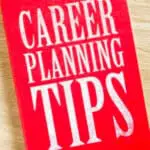 An information interview is asking someone questions about their career path, a program they took, or the organization they work for with the aim of learning about an area you want to explore. It’s not asking someone for a job. But your enthusiasm and ability to communicate clearly in an informational interview are key to people remembering you when there is a potential job opportunity down the line.
An information interview is asking someone questions about their career path, a program they took, or the organization they work for with the aim of learning about an area you want to explore. It’s not asking someone for a job. But your enthusiasm and ability to communicate clearly in an informational interview are key to people remembering you when there is a potential job opportunity down the line.
Who can I talk to?
You can interview anyone who knows about the program or work you would like to do, ideally:
- Start with people you already know
- Find people using LinkedIn or Ten Thousand Coffees
- Approach new contacts (ex. speaker from an event, friend’s colleague)
How do I contact them?
Start with an email or LinkedIn message. Follow up with a call, if need be. Arrange a meeting.
What to write in the message:
Intro + what you want (ask for advice)
- As a mid-level professional in Project Management with a strong interest in…I would like to get your advice on…
Why you chose them (personalize it)
- I am interested in talking to you because…
Who you are
- I have a background in…and would like to use my experience in…to make a transition to…
Request
- I would like to pick your brain about.. over a 20-minute zoom call or coffee. Let me know if that works for you….I look forward to hearing back from you.
There is no need to attach your resume/CV at this point.
Before the meeting, think about the type of information that would be helpful to you and come up with some questions. In the end, thank them for their time and ask if there is anyone else they would recommend you speak with. Take notes and then following the interview, send a “thank you” note or email within 24 hours of the interview.
SUGGESTED QUESTIONS
- What has your career path been like to date? Is it representative of most people in this kind of position?
- How did you get into this field? How did you choose this program?
- What education/training do you have?
- Are you a member of any professional orders or associations? Which ones do you feel are the most important to belong to?
- If you could do things all over again, would you choose the same path for yourself and why?
- What does a typical day/week in your job look like?
- What do you enjoy the most about your job? The least?
- What skills have you found essential for success in this occupation?
- Could you tell me about one of the main challenges you face in this position?
- How many hours do you work in a typical week?
- How much autonomy do you have in terms of what you focus on at work?
- What kind of supervision did you have when you were starting out? Now?
- How is your performance evaluated?
- What kind of professional development opportunities are available?
- What advice would have helped you when you were starting out?
- How would you recommend I “try out” this line of work (i.e. through an internship, volunteering, shadowing…)?
- Is there anyone else you recommend I talk to next? Do I mention that you referred me?
TIP: For those who cringe at the idea of networking or interviewing someone – especially a stranger – just remember that if you come off as genuine and interested, they will most likely want to help and engage with you. For the most part, people like talking about themselves when the other person is actually curious about their area of expertise, so when you provide them with your undivided attention in an informational interview, there is a beneficial exchange for both parties.






